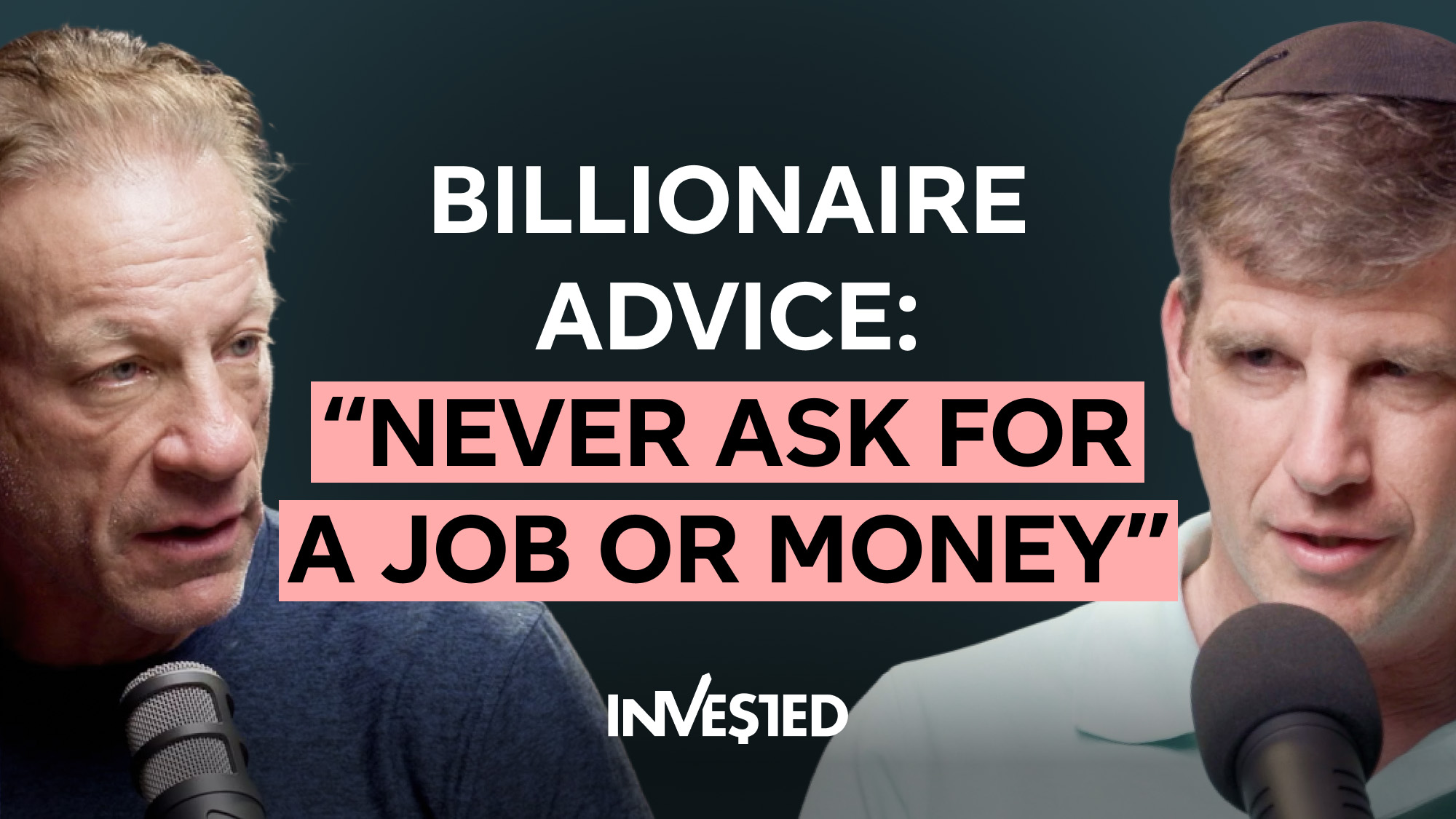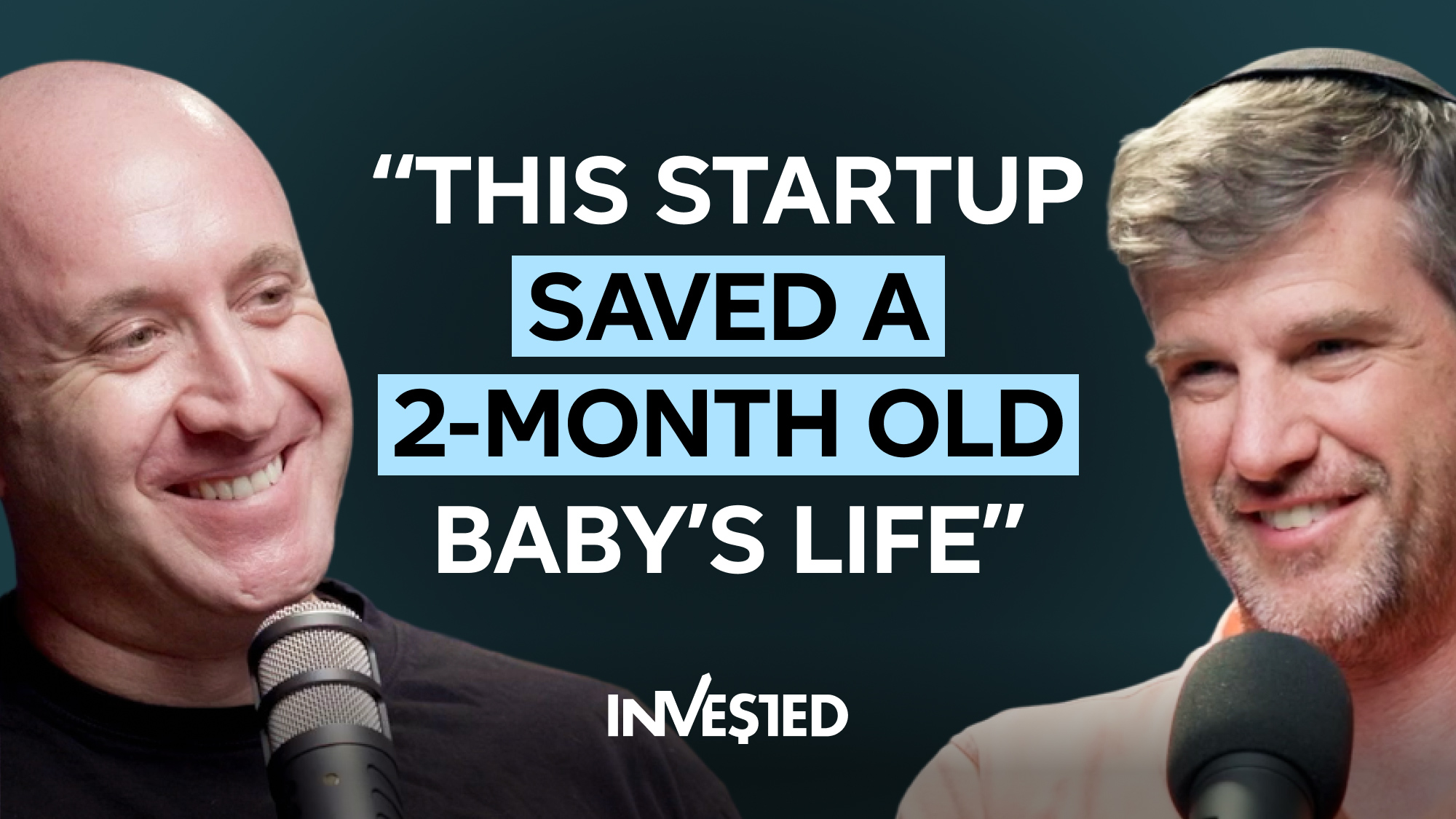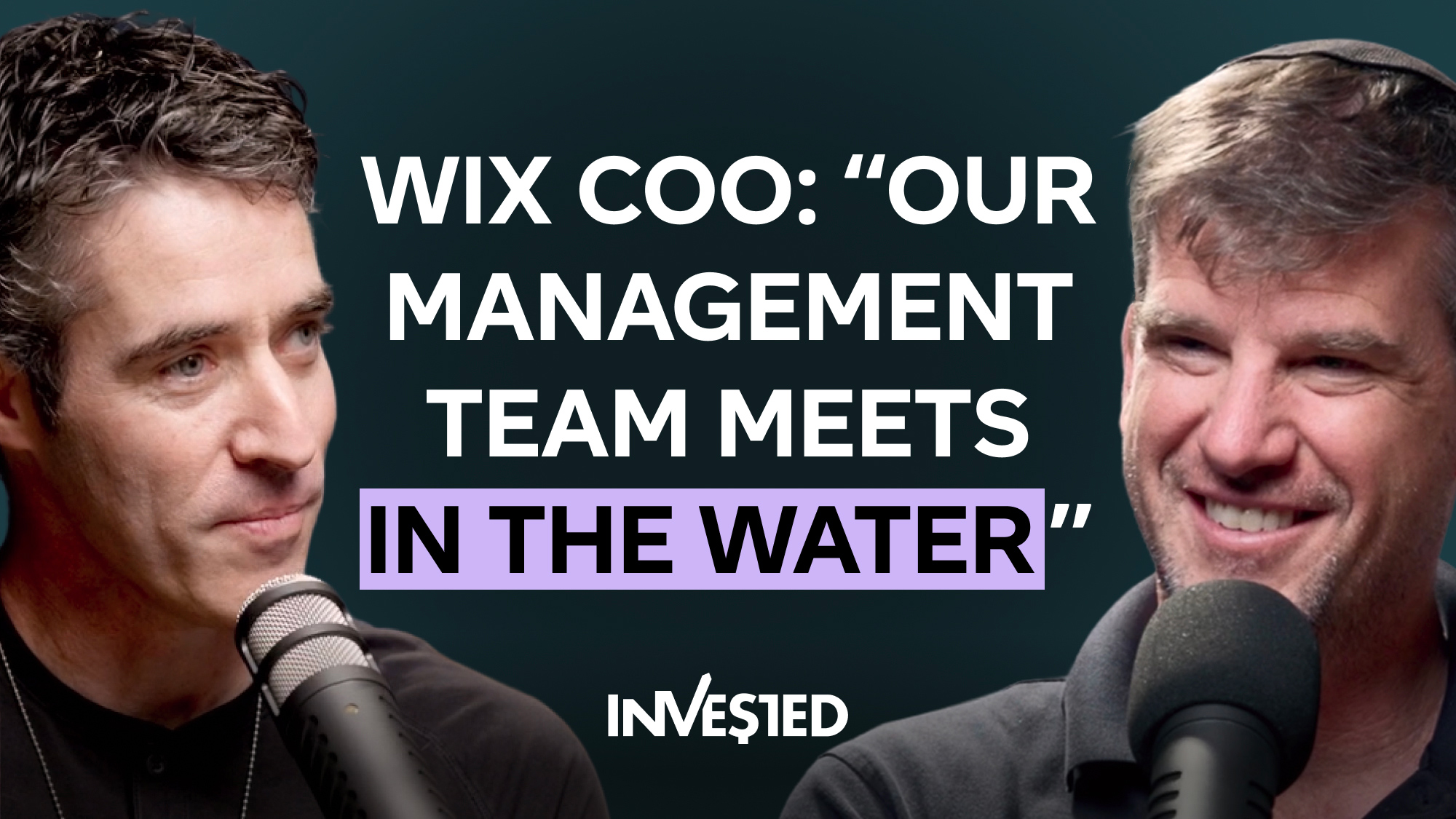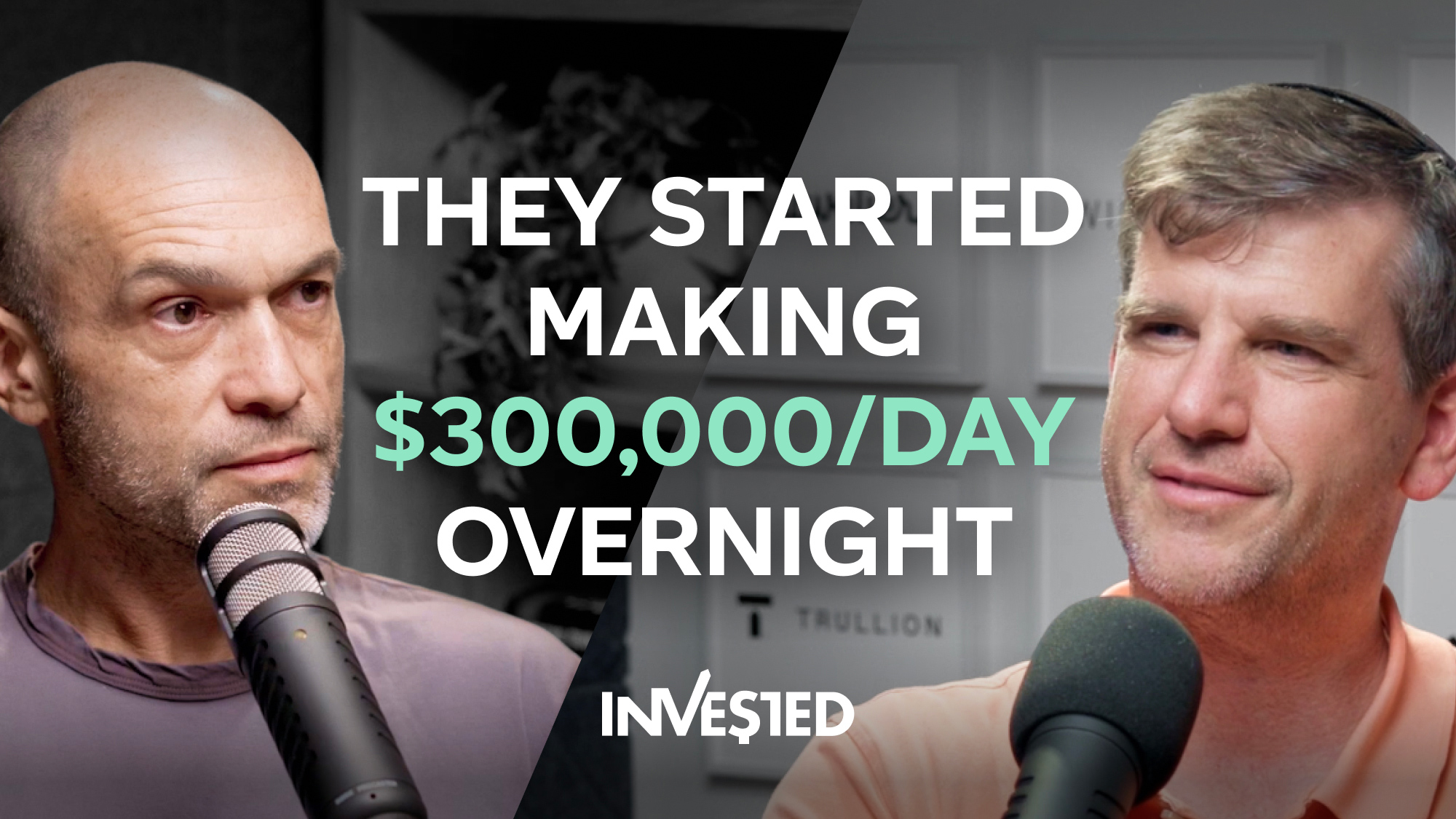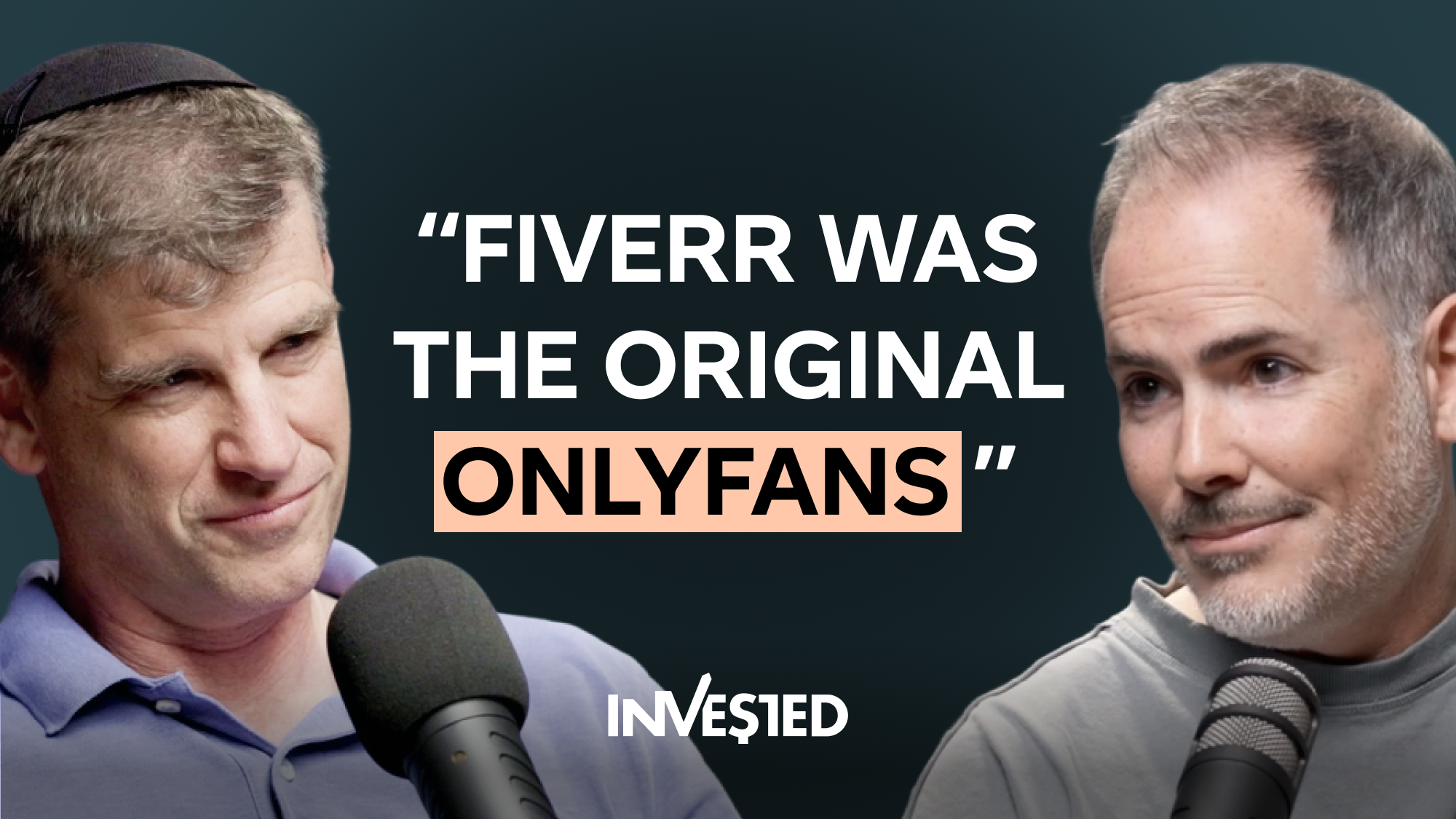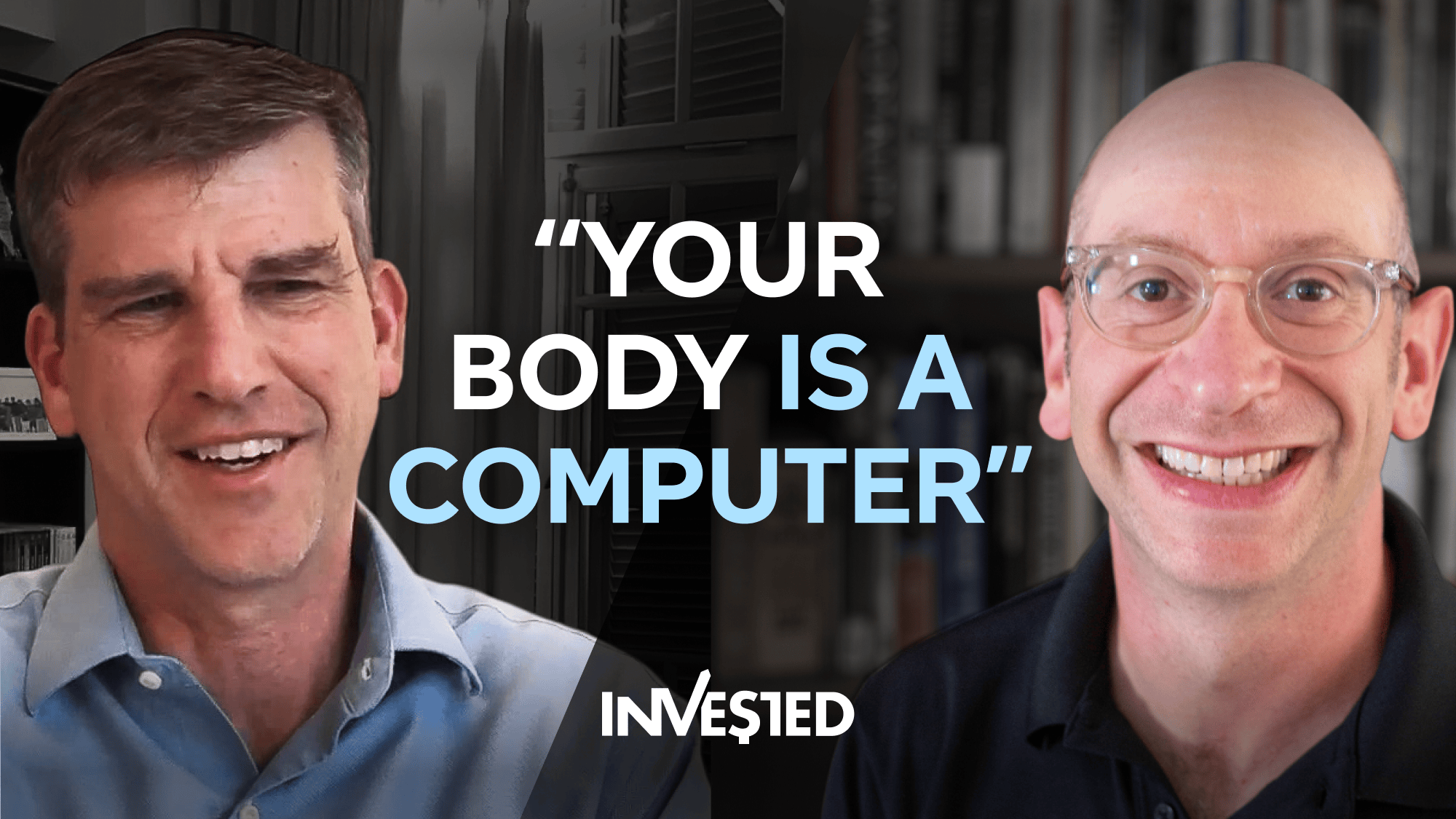Yonatan Adiri Part Two



You can’t go ten minutes without someone talking about AI, but most of the time, it’s hype without substance. Almost Human exists to change that; to dig past the noise and reach the sharp ideas, technical breakthroughs, and human stories that actually shape the future.
Let’s cut through the noise.
Yonatan Adiri Part Two



How can values create value? On this podcast, Michael Eisenberg talks with business leaders and venture capitalists to explore the values and purpose behind their businesses, the impact technology can have on humanity, and the humanity behind digitization.
Yonatan Adiri Part Two
Yonatan Adiri Part Two

Yonatan Adiri Part Two
Yonatan Adiri Part Two
- [00:00] Intro
- [01:10] Stepping Down as CEO
- [05:40] Realizing You’re not the Right Guy
- [07:15] Finding Healthy’s New CEO
- [10:40] How Did it Really Feel to Step Down
- [16:31] Why Geoff Martin as CEO
- [19:10] Regulation in Healthcare
- [21:45] The Investor’s Perspective on Changing CEOs
- [24:00] Critiquing Your Board Member
- [26:50] The Era of Continuous Disruption
- [28:35] The Next Decade for Yonatan Adiri
On part two of this episode of Invested, Michael hosts Yonatan Adiri, the founder and president of Healthy.io.
Yonatan Adiri is the Founder, former CEO, and current President of Healthy.io. Born to refugee parents from Iran and Iraq, Adiri concluded his undergraduate studies at the age of 17 and spent the first 15 years of his career in Israel's public service. In his last role, Adiri was entrusted by one of Israel's founding fathers, Nobel Peace Prize Laureate, HE President Shimon Peres to serve as his senior advisor for tech diplomacy and ultimately served as the President's Chief Technology Officer.
Adiris's technology and public sector expertise were recognized by TIME Magazine (2018 one of the 50 most influential people in healthcare), The World Economic Forum, where Adiri spoke at several annual Davos gatherings, CNBC (Disruptor of the Year award, 2020), and FT (Bold in Business Award, 2021).
Please rate this episode 5 stars wherever you stream your podcasts!
Yonatan Adiri:
You know, in many times throughout the journey, I always asked myself: Am I still the right guy to run the company?
Michael Eisenberg:
Welcome to part two of Invested with Yonatan Adiri, the former CEO of Healthy.io and its founder. Today, we're going to talk about Yonatan's decision to step down from Healthy.io. We think it's a super interesting and meaningful episode, a must-listen for any entrepreneur and investor. So join me as I talk again to Yonatan Adiri.
So let me summarize this for a second, which is, you went through four extinction events. You're serving a million patients that you're preventing from ever having to get to dialysis. You saw AI coming before just about anybody else did, and built it into the phone and into the cloud. There's PersuasionOS, which is AI driven and now generative AI driven.
Our persuasiveness for healthcare, ColorAI, which is AI for analyzing all these machine vision, these incredible samples of dipsticks and urine sticks that you’ve done. And this company was born out of your mother's injury in China, and you're a decade in, and, so you just stepped down as a CEO?
Like, why?
Yonatan Adiri:
I think–maybe two fundamental points about the journey. First and foremost, as I've shared openly, for me, public service was always, and specifically in Israel, right–for me, for my wife, for my community–was always priority number one. I think that, in many times throughout the journey, I also have my own, I would say, motivation from that perspective.
And I always ask myself, as companies and our company morphed, right? And you've seen companies outlast a decade and becoming generational capacity companies–they morph. Because reality changes and you’ve got to morph. So in every morphing, at least four, I asked myself a question: Am I still the right guy to run the company?
When we survived the first extinction, am I the right guy? And I think where Healthy.io is right now, the vision is very clear. The technology engines are very clear. The management team is phenomenal, globally and in Israel. Our ultimate test right now is, how do we extend sales in the U.S. over the next 24 months? Can we unlock some of those big contracts that we've won? Can we unlock collaborating with the government, the NCQA and others, and push through 1 million to 10 million patients, right?
When we do that, healthcare is gonna–it's forever changed because of Healthy. Digital healthcare is forever changed because of Healthy.
But I think the space of what can be done at home depends on how well we do our next nine million tests. Now, when I ask myself, am I the right person at this point in time to drive nine million patients in the U.S–which is the target market, ultimately, you want to IPO, you want to raise more capital and build that 2030 platform–somewhere in ‘23, my answer was, I'm not sure.
For the first time in over a decade of the company, but almost 12 years of journey for me–and I think we can share with the audience, we've had conversations about that and you've given me a lot of food for thought into how to run through that process myself, and get to the conclusion, get to the answer.
So that was the process that kicked off. I also had a severe injury that, roughly, about a year ago, that also got me to think in a more profound way about that, right? There's a saying in our, by the Jewish sages, I don’t know how to translate it into English that well–
It's,
Michael Eisenberg:
You do the Hebrew, I’ll do the English.
Yonatan Adiri:
“Lo alecha hamlacha ligmor, v’lo ata ben horin levatel mimena.”
Michael Eisenberg:
“You're not required to finish all the work, but at the same time, you don't have the privilege or the ability to walk away from it.”
Yonatan Adiri:
Exactly. So that kind of was very strong with me. So when I decided to transition somewhere in, call it July, and we were looking for the right person to take the CEO role, it was clear that the goal–look, I'm not the best sales guy in the world. This is about sales. This is about scale. And it needs to be, in my view, at this, at the next morphing of the company, an American CEO. Now that doesn't mean that the work is done. It doesn't mean that I'm, that it's not incumbent on me to be there to see it through.
And therefore I'm, I took the role of President, I'm doing the work on public affairs. But there's also a question of another quote from our sages which is, if you want to, I don't– “Al tomar l’kshe’epaneh eshaneh, shama lo tipaneh.”
Michael Eisenberg:
“Don't say that when I free my time up, I will study, because you may not free any time up.”
Yonatan Adiri:
Exactly. So the idea of going back to public service and going back to serving the community at large here in Israel, there's always going to be a good, quote unquote, excuse out of the Healthy journey to say, “Oh, I'll do it next year when we IPO. I'll do it next year when we cross the 5 million people. I'll do it next year.”
It's a never ending thing. And for me, that calling is very profound.
Michael Eisenberg:
But what made you figure out that you're not–like founders morph also. So what made you figure out that you're not the right guy? Suddenly when it comes to this big commercialization push in the U.S., what's, what was the moment or the trigger?
Yonatan Adiri:
Yeah, I think you gotta, you really have to be very honest with yourself, right?
Michael Eisenberg:
Most people aren't though, isn't that true? Something must have caused, it must be a something.
Yonatan Adiri:
Look, again, honestly, for me, we've, we didn't manage to crack it for a certain period of time.
Tried different approaches. And really, honestly, for me, at some point, you gotta look at the empirical data and say, “This is a task for someone who's done this four or five times.” And in many ways–by the way, the task we have in front of us over the next 24 months is a task that has been done before in a way, right? Like it has a method and there's ways to go from 1 million to 10 million. Whereas the tasks we've had before, there was no textbook. There was no epistemology. There wasn't, “Oh, you do this to create the medical selfie.” Medical selfie 101, right? Sales of 1 million to 10 million post FDA, there are textbooks for that.
And I genuinely believed at that point, so come July, August that, for me to morph into that would be, just not a good use of shareholder value, not driving shareholder value the right, within the right time, in the right velocity. And so that was the driver for my decision in a way.
Michael Eisenberg:
So you met like a lot of candidates, a bunch of candidates for the CEO job along the way. And you said to them, “Hey, I'm going to step down.” Number one, did they actually believe you?
Yonatan Adiri:
No.
Michael Eisenberg:
No, most of them didn't believe you.
Yonatan Adiri:
Yeah.
Michael Eisenberg:
And they, because they thought you'd get in the way, you wouldn't give up the job.
Yonatan Adiri:
Yeah.
Michael Eisenberg:
And how did you persuade them that you were serious, that you're actually going to do this?
Yonatan Adiri:
I sent them to you. No, but honestly, I think that, conversation one, a lot of people didn't believe. But when you–the four or five finalists that went through a few hours of a journey with me in terms of how decisions are made, and then met Oz, who's our COO and CFO, and met Ron, who's in many ways my Co-founder that came in one year later, and the credit for the execution on the ColorAI and the Persuasion is all his in that sense, right?
And they saw people who really gave them the sense that I'm very credible, and when I say something, that's what I do, and they've been through quite a long period of time with me. And that's something we're very proud of, by the way, as a company. We are a core team of about 60 people that have been doing this for almost nine years together.
Michael Eisenberg:
Yeah. Nobody left. The loyalty is incredible.
Yonatan Adiri:
Yeah. And so when some of those candidates expanded, spoke to Naomi, spoke to Oz, spoke to Ron, they were like, “Oh. He means it,” right? “He's a serious guy.” And also the type of management strategy we built was always 90-10, right? I have had a philosophy of always managing the vacuum, right? So in the beginning I did everything. I dipped sticks, I went to the lab, whatever. At a certain point–
Michael Eisenberg:
I remember, by the way, you showing me very proudly this little bizarro robot, in that office on Rothschild Boulevard. It was like a box.
Yonatan Adiri:
Yeah. on Rothschild.
Michael Eisenberg
It looked like it was out of a, I don't know, like a, like a–with a million lightbulbs in it that were going off in different ways.
Yonatan Adiri:
We called it, we called it “The Automator.” And jokes aside, like we, how do you generate–ultimately, again, let's geek for a sec on the tech, right? This is very advanced optics. You need to recreate color from a sensor that you don't own, in a lighting condition that you have no idea. Because every person, literally a million tests, a million lighting, a million spectrums, right?
Michael Eisenberg:
Let's just say the lighting in the bathroom stall in the public park is not the same as the lighting in the bathroom stall in my house, or anywhere else.
Yonatan Adiri:
And, where people test, it's the privacy of their own home.
Some folks have a blue wall, some folks have a yellow wall. Like, it affects how you–that's why it's very hard to compete with us. So we had to generate enough data to even start developing the algorithms. And we were like, what are we going to do? Are we going to just go and take pictures in certain places?
So The Automator was born and actually carried out its role. Long story short, I did marketing in the early days. I did a lot of things in the early days. But as those fields got kinda, I would say, there was less haze and more clarity? We brought in the best people to do that and I moved on.
Come 2019, right? We had the best product person in the world doing this. We had the best CFO in the world doing this. We had the best marketing person in the world. So I was kind of, I don't know if you remember, I used to tell, little did I know that I ended up in a way predicting something–I used to tell the board, if I get injured in a car accident, the company would not feel that for six months out. That's how I want to design my management. I need to be busy with things six months onwards. Company needs to run impeccably. And it has the best management team to run impeccably for six months out, at any given moment.
Michael Eisenberg:
I know. I sat there when you handed the reins over to Jeff Martin, and we'll come to Jeff in a second. And the question I asked myself, but I reserved it for right now is, like, how did you really feel? This was your fifth child.
Yonatan Adiri:
Yeah. No, but listen. I think we are at a point right now in the world where we are witnessing what happens when folks at the top hold on to the reins for too long. Across the globe, across industries.
I think it's ultimately a healthy thing to do. I'm a very emotional person when it comes to my family, my kids, Israel and values, but when it comes to the entrepreneurial track, I'm very kind of, purpose-driven, and very honest and very diligent in the sense–Billie Jean King has this beautiful quote that says “Pressure is privilege.” I always knew that on the journey. And we've been through some hard times, with the FDA delays and stuff like that. I, for me, that pressure was always a privilege, because I knew we're building a company to serve people. There are, I came to the company from public service where I saw really, world-changing hard stuff.
The sausage factory that is Global Statescraf, it gives you perspective. So for me, yes, in many ways, it is a baby. It is, but I–for instance, I never spoke of Healthy.io as a family. Never. And I also told that to our team. This is a place where we have a, we sign a contract every day of trust. That you want to come here and you want to be part of what we're trying to do in the world. And when you'll just, when you'll decide to leave, it's totally fine. And when we'll decide to part ways with you, because of merit, because of change of direction, whatever, we both know that there's a bigger goal here, and we're trying to get there. To serve people, to get to a million patients, 10 million and whatnot.
And I'm not going to give you some fake language on, on family and then fire–I don't fire my kids, right? From that perspective, pressure is privilege. The company is a company. It has a purpose, it has shareholders. And for over a decade I felt genuinely that I'm the right person to drive that value. And so in many ways when I handed the keys over to Jeff, I just knew it's the right thing to do.
Michael Eisenberg:
You know when I started my career, it was very common that you brought in the professional CEO to replace the founder. And then there became this thing about “founder friendly.” Where everyone wanted to be the most founder friendly, and there's some truth to it. Michael Dell created an incredible company, and Bill Gates created an incredible company.
They forgot about the vast majority of companies that were actually created by the CEOs that were brought in. But, this mythical kind of founder thing–and you speak about this now almost transactionally. And, it's not my baby, it's not my company. And that is not a, doesn't fit the narrative or the zeitgeist around the mythical founder figure.
Yonatan Adiri:
I think everything is a system. Everything. Like things come together, right? If you're, if it's all about you, you're a mythical founder and you built the company that way, then it's not resilient enough, right? If it's about you, you don't go through four extinction events and have your management team intact and tackle it and get to a million patients.
You just don't, it doesn't happen.
Michael Eisenberg:
Maybe if you're a great leader, you can, right?
Yonatan Adiri:
So I think greatness in that space, right? So I'll give you an example. When Facebook IPOed. And the whole notion of eternal founder control in the public market was legitimized. I looked at it and said, that's wrong.
He can be an amazing leader. And I have, obviously, it's an incredible company, but from my perspective, I wouldn't even want to have that. If I can't convince my board–again, it's a private company,not as a public company–of a certain idea. And I bring it to a vote and it's voted against and I don't have a super voting share–I should think through why that happened, right? If qualified, smart people on my board, I don't know, 8 out of 10, think completely different than what I think–
Michael Eisenberg:
But maybe we're not so smart though. We don't see the same things, like I couldn't have invented Healthy.io.
Yonatan Adiri:
So I'll convince, I gotta be able to convince you. Again, I'm not a publicist, this is not open to the Carl Icahns of the world, right?
Michael Eisenberg:
Yeah.
Yonatan Adiri:
There's a genuine, in the private market still, there's a, should be a genuine kind of shareholder, kind of driving together. So for me, I never wanted this to be about me, right? That's not something I ever had in mind.
Michael Eisenberg:
Is that unique to your personality or would you give the same advice to every other founder?
Yonatan Adiri:
I think, look, one of the things I learned from running clinical trials time and time again is that, for some things, N equals 1. I really, I think it's like, the mental strength you need to go through a journey of a decade in building a company makes it so, renders this decision to be very personal. Some folks, and there's no right or wrong, right? Some folks need that. And by the way, some folks also get energized by that. That's–them being at the top in a pyramid structure energizes them? Kudos! Great. If that's what gives you–but for me, that, that's not what gave me the force to withstand the crazy upheavals of FDA grade digital health on a pioneering track.
Michael Eisenberg:
But do you worry the company will lose some energy because you're gone?
Yonatan Adiri:
I don't think so. I think we, again, I think the company needs different types of energies right now. Yes, it would lose some energies that I brought forward, but the kind of energies it needs right now, Jeff delivers way better than I could ever.
Michael Eisenberg:
So tell us why, Jeff.
Yonatan Adiri:
As you said, I met many many candidates, and I think one of the most critical pieces, and–the finalists were all great salespeople, established, right? You get to the last part where the finalists are very close to each other from that perspective.
There's one thing that Jeff kindled in me and listened carefully in those conversations and gave me that trust–and by the way, it's now been a couple of months, and I have to say he's doing like 10x than I thought, like from that perspective, specifically, he gave me this feeling that from a cultural perspective, right?
He's going to be an amazing fit.
Michael Eisenberg:
So you hired for culture, not capability?
Yonatan Adiri:
No. So I'm saying I hired for capability until we got to four finalists. And all things being equal on capability, right–one of the four was, Jeff stood, was towering over the rest in the sense that, I'll say it in a way that, it's a cross-cultural, honestly, like Israel, U.S., he was the most Israeli in terms of his ability to communicate to me grit, forward-looking, I'm going to get this done and if it doesn't work this way, I'll do it that way. And if it doesn't work this way, I'll do it that way. And for me, that is a critical piece. I'm just non-romantic.
Michael Eisenberg:
Like he turned up here for the handoff in the middle of the war. I agree.
Yonatan Adiri:
Exactly. Exactly. So for me I'm very, I don't have any romanticism about entrepreneurship. It's hard. It's hard. It's, and especially when you're pushing against a medical convention with a regulator on top, it is very hard. And you meet people along the way that are not open minded, that have been hit by Theranos. They have legitimate rights.
Michael Eisenberg:
Would you tell people not to do a healthcare company if they came to you for advice?
Yonatan Adiri:
I think it's a broad–now where we're headed, it's a broad gamut of healthcare companies. For instance, bio bioinformatics, definitely.
Michael Eisenberg:
Definitely yes?
Yonatan Adiri:
Definitely. Yes. Yeah, I think it's a field that’s sort of starting to behave more like software. It's very hard to differentiate. You got to have, it's almost, you got to have a molecule quality to your AI, right? And by the way, there hasn't still been a big success in that space. I think now the CRISPR companies are coming and it's going to be different. But bioinformatics for sure. Go for it. But I think, yes, there is, you gotta go for it. Just know that it's going to be a journey that involves so many different stakeholders that you're going to have to convince, and many times they are, they have conflicting–
Michael Eisenberg:
And can we actually get like the innovation we need given the regulatory structure?
Yonatan Adiri:
No. No, we can't. No. Look, we're pasturing in many fields of the world. We're pasturing sick and hungry, holy cows. You know what I mean? Like in regulation, everybody knows it's, there's so many holy cows. Don't do this. Don't do that. We all know that system doesn't work. We're still pasturing them, right?
And I was hoping–
Michael Eisenberg:
We're putting them out to pasture.
Yonatan Adiri:
Sloooowly. Yeah, but listen, there needs to be a slaughterhouse, not a pasture for that kind of stuff. We need to reinvent these things. And I was hoping, and just to give you a sense, COVID was a great example of slaughtering those holy cows. To allow for mRNA in billions of people with I don't know, five, 6,000 people, clinical trial, is unheard of. Like that was not anywhere near the dogma that the FDA would consider come, circa early 2020.
And still a year later, it happened, right? Look, it's been, what is it now, 3 billion injections, 4 billion, 4 billion. Mortality rate hasn't changed. We're not seeing it. Imagine how many people are dying right now because of those holy cows that are sick, and we’re not willing to touch them and say, okay, in the era of CRISPR, we don't need that, right?
Michael Eisenberg:
You know, I think back to the conversation you said about Shimon Peres. I feel like Shimon Peres, if he was chairman of the FDA today, would have not missed the opportunity to make a foundational change in how we speed up innovation.
Yonatan Adiri:
I agree, but I have also a lot of respect for them in terms of, they're liable and they're accountable. It’s the structure around them that also–again going back to Shimon Peres in ‘85–there's one way of saying we need FDA reform. That's glib. That's not the story. Yeah, because if you hold the FDA accountable and you're telling them, reform–it's very hard for them because they're the ones on the hook, right?
But if you're telling them, “I'm gonna change the entire incentive structure, me as a country, the CFR the Federal Code of Regulation around health care. I'm gonna go to Congress. I'm gonna change that, so you're not on the hook solely.” And you're going to build a different kind of multi stakeholder process around that, which by the way is starting to happen.
Michael Eisenberg:
Slowly.
Yonatan Adiri:
Then you're going to get the FDA being willing to have more appetite. But it's unfair to say, I'm going to reform. That's my kind of thinking right now. We're trying to reform stuff, but we're expecting foundational changes. That doesn't come from reform. It comes from a foundational change.
You can't keep the FDA with all the liability and then ask them to be radically different in terms of how they review drugs. You've been with me since the early days of this journey through a lot of crises, a lot of good parts also, and have mentored me and have been a person that I looked up to in many tough decisions.
When I stepped down, you asked me about how I felt about it. Like, how did that feel to you? You've seen companies transition. You've seen that, that growth episode.
Michael Eisenberg:
The first thing–one of the ways I try to measure myself is if I have had a good experience with somebody, and they're not all good experiences along the way, do we stay friends afterwards?
And so more important than anything is, I think–you'll tell me later–that we've developed a friendship and a professional relationship that goes beyond the company. I hope to keep working together for many years.
Number two, as I said before, I don't think stepping down is a bad thing.
In fact, I think we've gotten too, quote unquote, “founder friendly,” that you follow the founder blindly till the end of time. And I think finding a way for founders to be self reflective like you've been, and to make the right decision for the shareholders in the company, is really important.
This is not Kumbaya. The rules of capitalism say that the company belongs to the shareholders.
Yonatan Adiri:
100%.
Michael Eisenberg:
And the founder and the CEO serves at the discretion of the Board of Directors. Now, you made it easy for us. We didn't fire you. We didn’t need to fire you. You decided to initiate the process, you know, in consultation with us and the rest of the board. And I think that's admirable, right?
I think it's, you deliver an important lesson, which is, if a founder feels like there should be somebody else telling the job and doing the job, and someone else could do a better job. There's nothing wrong with saying, let me go get someone else. There is, there's greatness in that moment of self recognition and doing it, and it's often better for the financial well being of the founder too to have somebody else to take this forward.
So how did I feel? I was challenged, because it's always challenging. Change is challenging. And you've worked alongside somebody who you have built trust with. Over that time, I hope we’ve built trust.
So it's challenging, and at the same time, I think it's inspirational. And candidly, I'll share with you, I think it was the right thing for the company, and for you personally. I'm glad we're here.
Yonatan, for the peanut gallery over here that stands in the background that the viewers can't see–they'd like you to offer me criticism on my role as a board of, as a board member and an investor.
Yonatan Adiri:
Look, I think what probably is different and Healthy than other portfolio companies–I'm venturing, I don't know if it's true–when you made the decision, and the partnership made the decision, to invest in an FDA grade-seeking company, I think you knew you're going on a journey in which in some areas you won't be able to go to the founder and say, “I've seen this before. This is what we should do.”
So, would I’ve wanted to have somebody on the board that had more conviction and had, built companies and sold them or IPO them in the healthcare space? For me, the fact that–
Michael Eisenberg:
So you've correctly pointed out that I knew absolutely nothing about this business that I invested into, or the regulatory journey.
Yonatan Adiri:
And that, and you can argue both ways about that. And for me, the knowledge that I can come to you and you'd be unencumbered, right? Because you haven't been there before, but your pattern recognition of seeing similar situations that kind of ring a bell–and, go back to what I told you about my parents, this was very much like how I was brought up, right?
I'll think about it with you, I'll highlight from–but it's your decision. That's how I would think about it, but I totally respect any decision here, so long as it's well thought out and presented and we bring it to the board. That process we went through, I think, hundreds of times through that process, when I would come and you'd say, “Well, I haven't seen this before.” You had that humility to say, “I haven't seen,” but you gave me, like, ways to think about it. And then you said, “You know what, and go think about it. And if it's a well thought out answer, let's move on.” And, were there some mistakes I've made that you could have probably prevented and I probably venture, you’s say, “I'm going to let him make that mistake.”
Michael Eisenberg:
And I probably couldn't have prevented it.
Yonatan Adiri:
And no, but like in, in a guarded way, right? Created a space where I can make certain types of mistakes that would teach us and get us to become better management. around DTC back in the days, and UTI and so on. I grew a lot through that and, it's a disadvantage to invest in a company that goes through the FDA when you haven't had that experience before.
But it's also a great advantage, because the curiosity and the kind of pattern recognition capacity gets you there. That's an honest, you know to the peanut gallery.
Michael Eisenberg:
I kind of, thank you for telling our LPs that they have a partner that they've invested in, that invests in things he has no idea about.
I appreciate that. So as we come to the end here, I want to ask a couple of questions. I heard you give a talk in Basel, Switzerland.
Yonatan Adiri:
Yeah.
Michael Eisenberg:
I think it was entitled Continuous Disruption. The Era of Continuous Disruption.
Yonatan Adiri:
Yeah.
Michael Eisenberg:
Can you summarize for us in a minute or two what that is?
Yonatan Adiri:
So yeah. In essence, when I came back from NASA, one of the things I realized is this exponential growth of tech with a declining price, like a deflationary tech, is not going anywhere.
This is the new norm. And when we were looking for what that does and what asymmetries it creates, we realized it's a nonstop thing. I came to the President, he was a naming guy. He needed a name for it. So I showed him, it's, I buy it, how do we call it? And I had to go all the way down to Trotsky. He's the one who called it like the ‘permanent revolution,’ the era of permanent revolution.
Peres, by the way, called it an ‘era of permanent genesis,’ which is better, right? This is what we're seeing in Gaza, this is what we're seeing in Russia, this is what we're seeing with Iran. It's never been easier to leverage technology to create a change, a radical change in the world, for better and worse.
So that's how I think about where we are right now. It's precarious. We are in a very dangerous point in history. If we have the moral authority, and if we have the morals right, we're gonna get CRISPR, get rid of cancer, we're gonna have bioinformatics introduce new drugs, radical life extension–we're seeing that with GLP now with Novo Nordisk–or we can end up, going back to the Middle Ages, the type of violence, dirty bombs.
It's a Promethean, almost a Promethean period, and what do we do with that? That's where the era of permanent revolution takes us.
Michael Eisenberg:
And when you think about this era of permanent revolution–and you've done a decade now in entrepreneurship and before that in public service–what does the next decade for Yonatan Adiri look like?
Yonatan Adiri:
Government for an era of permanent revolution, right? I think civilians, specifically in democracies, are underserved by those–it's the same pasture of holy cows that are sick, right? And nobody's willing to touch them, the way the late ‘70s saw a radical change in how government delivers on its promise.
That's where we're headed, and that's where I'm going to dedicate my time over the next few decades.
Michael Eisenberg:
Is that in politics? Is that in the bureaucracy? Is that in–
Yonatan Adiri:
It's, I think, look, these are the first few weeks that I'm opening my head to that, but I think first and foremost understanding the kind of, establishing the slaughterhouse for the, for those holy cows is critical.
Like understanding–
Michael Eisenberg:
You're going to focus, there's going to be a lot of dead cows. We should just be aware of that.
Yonatan Adiri:
Exactly. No, I think, and you've written about this extensively, right? You can't expect to get change that is radical without radical action. And radical action has a price.
When 15,000 people from the public service of Israel lost their jobs in 1985, that was radical. That was painful, right? You can't get there without that. And we need the kind of leadership that would be able to tell that to the public in all truth and all honesty. Now, when it comes to Israel, I'm super bullish and super optimistic.
We are a 550 billion dollar economy. In, in less than 35 years. We were at 410 percent inflation. Now we are at 65 percent debt to GDP ratio.
Michael Eisenberg:
One of the best in the West.
Yonatan Adiri:
We have 150 billion of net cash reserves, right? The best, one of the best tech scenes in the world. Capital around some of the best academia in, in also the most important fields in quantum computing and so on and so forth.
There has never been a point in Jewish history, I think in the last 2,500 years, where a Jewish leader would stand and have all this at his disposal, or her disposal, to pave the way for a century of growth and prosperity. So I think we are at the point that, again, like ‘85, if we take this crisis, and we allocate the political capital to the holy cows, as opposed to adjusting and reforming and thinking we're just going to plow through, we're going to be missing a historical magnitude of an opportunity.
Michael Eisenberg:
And if you go do this, and we, after 120 years, we say, how should we remember Yonatan Adiri at the end of his life. What should we say?
Yonatan Adiri:
Look, I think in all honesty, I would want to be at a point where I'm at least a footnote in the history of the process that got us to that point. I think we're gonna, by the end of the decade, we're gonna have to look radically different.
Michael Eisenberg:
The opportunity is enormous.
Yonatan Adiri:
It is. It is aligned with, we are very much aligned with where the world is going. An Indo-Saudi-Israeli axis, right? From a geopolitical–you take Herzl right now. We're all kind of gloom and doom right now, right?
Michael Eisenberg:
Not me. It’s a bit hard, but no.
Yonatan Adiri:
If you take Herzl, you tell him, and you put him in the Prime Minister's office, right?
And tell him, “Hey,” that you have peace with, you have the Abrahamic Accords, you're on the verge of normalization with Saudi Arabia. Peace with Egypt, half a trillion dollar economy, run the country–I can't believe that! For 125 years, that's what you guys were able to create! Right?
Whereas when you think about him in 1897, fighting against 2000 almost years of like non-sovereign Jew thinking, right? Like almost like an immune system to sovereignty that we've built over 2000 years. Almost a million people running away from Russia after pogroms, and not going to Israel saying, becoming sovereign? Nah, I'll just go to wherever, right, somewhere in the West.
And again, you've written about this extensively. Your book on Purim was transformational for me and how I understand Judaism. And how actually, when we're at the golden era, that's when we need to open our eyes, right? And that was, like, think of him. Nobody wanted to come to Basel.
Literally, the people who came to Basel were not the leadership of the Jewish people. And who came to Israel? Who believed in the idea of sovereign Jews? And you read about, when you read Ben Gurion, ‘20s, ‘30s, ‘40s, adversity, existential threats, like he was a, we were on the verge of extinction.
So if you tell them you have a half a trillion dollar economy, you're 10 million people, you're competitive globally, you have a very strong army, you're–
Michael Eisenberg:
Fast demographic growth.
Yonatan Adiri:
The opportunity is amazing, but we need to go back to the fundamental layer, right? There are some holy cows we cannot accept anymore.
And these are tough. There, there are tough decisions to make. They're gonna be painful. You said recently something that, that I'm trying to wrap my head around. And I'm paraphrasing, I don't remember it's, but Jews haven't had power politics for so long. 'Cause we weren't in, in power, right?
So this idea of having unity as the litmus test is wrong, right? We need to have unity of vision. We need to know where we're going, but it's okay to have an argument and it's okay to have some painful decisions that are going to be painful for certain types of people. I would say so long as we have a, the Israeli New Deal and everybody kind of chips in, then I think it's worthwhile.
Michael Eisenberg:
Thank you for joining me, Yonatan. Thank you.
You can learn more about Yonatan Adiri on X, formerly Twitter at Y O N A T A N A D I R I. He actually had a fascinating tweet earlier today about Germany. There's a story on Bloomberg today that German manufacturing is collapsing, talking about a country that needs to make a leap into the 21st century–Germany is one of them. And we wish them luck. And if you enjoyed this podcast, please rate us five stars on Spotify, Apple podcast, or wherever else you listen. Yonatan, thank you. Thank you.
Follow Yonatan Adiri on X
Subscribe to Invested here
Learn more about Aleph
Sign up for Aleph’s monthly email newsletter
Subscribe to our YouTube channel
Follow Michael on Twitter
Follow Michael on LinkedIn
Follow Aleph on Twitter
Follow Aleph on LinkedIn
Follow Aleph on Instagram
Executive Producer: Erica Marom
Producer: Sofi Levak
Video and Editing: Ron Baranov
Music and Art: Uri Ar
Design: Rony Karadi
Follow Yonatan Adiri on X
Subscribe to Invested here
Learn more about Aleph
Sign up for Aleph’s monthly email newsletter
Subscribe to our YouTube channel
Follow Michael on Twitter
Follow Michael on LinkedIn
Follow Aleph on Twitter
Follow Aleph on LinkedIn
Follow Aleph on Instagram
Executive Producer: Erica Marom
Producer: Sofi Levak
Video and Editing: Ron Baranov
Music and Art: Uri Ar
Design: Rony Karadi

